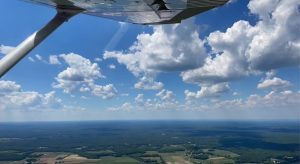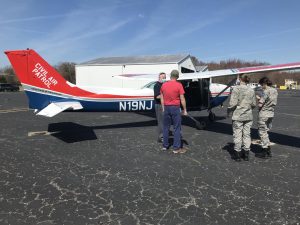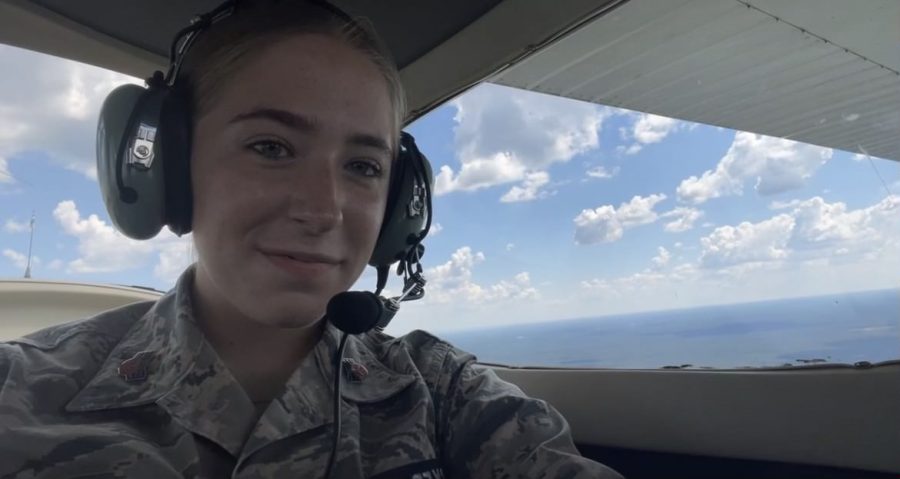Elena Decker (‘24) takes flight as part of the Civil Air Patrol Cadet Program
Below an early morning sky tinged with orange, the faint, whirring sound of a plane making its way down the runway is heard. On the ground, silhouettes scamper about, preparing for the aircraft’s departure. Then, all of a sudden, the engines roar to life, Kenny Loggins’s “Danger Zone” begins to play, and the plane accelerates, taking flight. This is the opening scene of Top Gun, the movie that has become an American cultural icon and praised by millions of viewers for its thrilling aerial stunts. However, for Elena Decker (‘24), Top Gun is more than just a movie — it was the inspiration that first sparked her love for flying and ignited her dream of becoming a pilot.
“Growing up, I’ve never wanted to have an office job and stay in my office all day,” said Decker. “So as soon as I saw [Top Gun], I thought, ‘[Flying] is actually such a cool idea,’ and I wanted to try it.”
For the past two years, Decker has been involved in the Civil Air Patrol (CAP) Cadet Program. The Civil Air Patrol is the civilian auxiliary of the U.S. Air Force, and its cadet program focuses on teaching youth the following elements: leadership, aerospace, fitness, and character. Decker currently serves as a cadet technical sergeant for the Jack Schweiker Composite Squadron, based at the New Jersey Armory. There, she has learned about aerospace and aviation, from the physics of flying to the mechanics behind a plane’s wings, engine, and more. As part of the program, she also attends leadership and character workshops, and must pass regular physical fitness assessments. However, for Decker, the most exciting part of the program is the time she spends in the air on orientation flights, or “O-Flights”. O-Flights give cadets the opportunity to take the controls and fly a small plane under the guidance of an instructor, allowing them to gain hands-on experience and accumulate flight hours. Decker took her first O-Flight in March of 2021, where she flew out from the South Jersey Regional Airport, and the experience cemented her passion for aviation.
While the thought of flying thousands of feet above ground might turn stomachs for some, to Decker, it’s thrilling. Nevertheless, maneuvering above the clouds is no easy task: unlike larger planes, small planes are susceptible to turbulence and pilots must adjust and adapt to even slight shifts in the air.

“Flying in tiny planes is pretty cool. Every time you’ll hit an air pocket or the wind will move a bit or something you actually [can feel it],” says Decker. “It’s not the same as in a big plane where you can’t feel anything [or] like you’re in a car.”
Thus, flying requires intense focus and concentration, and a steady hand. The first thing pilots like Decker learn is to avoid “white-knuckle grips” — that is, to stay loose and relaxed, despite your jittering nerves or excitement. Furthermore, a pilot must not only know the technical details of their aircraft, but also have an acute awareness of their surroundings.
“Flying isn’t as much looking at the dials as it is using your vision outside the plane,” said Decker. “[It’s more about] using the actual horizon line instead of focusing on the dials.”
Much like flying itself, the journey to becoming a pilot isn’t always smooth, presenting its share of obstacles. One of Decker’s biggest challenges so far has been balancing her involvement in the cadet program with her busy schedule as a high school student and as a competitive volleyball player.
“Not everyday is going to be an airshow or O-flight [so] just being able to stick with [aviation] can be a challenge,” said Decker. “I had to find a way to balance between being able to go to volleyball practices to [participating] in [the] program.”

Fortunately, Decker says she’s found an incredibly supportive community within the cadet program, helping her balance her many interests while honing in on her passion for aviation.
“At school, everyone’s kind of focused on themselves, but once you get into CAP, the seniors are focused on your learning and like helping you [with] exploring what you want to do,” said Decker. Furthermore, Decker has also met many role models through aviation. Though women make up a slim proportion of the field of aviation, just 9.02%, Decker has found herself surrounded by many inspiring women who inspire her to continue to fly. While she was attending a Girls in Aviation Day event, Decker had the opportunity to meet female pilots who had gone down the path she was on and flourished in such a male-dominated industry. For example, she attended a meeting with Miracle Izuchukwu, the youngest African American woman to earn her pilot’s license. On another occasion, Decker met a woman who was the private pilot for actor Matthew McConaughey.
I was kind of amazed, like ‘Wow, you fly Matthew McConaughey around?’” Decker said. “Getting to meet her, that’s when I first realized I could take two different paths… I could go through the military or I could go through commercial [aviation].”
Decker hopes to apply for military academies, such as the Air Force Academy, or universities like Purdue or Ohio State, both of which have established successful aviation programs, to pursue either military or commercial aviation. Despite the contrasts between these two realms, they both remain have a core quality that Decker adores: traveling.
“From being a kid, traveling was what I loved, and so the idea that, either way if I wanted to do military or commercial [flying], being able to travel is what I really want to do,” says Decker.
Even when she’s not traveling, Decker loves taking on new hobbies, such as rock climbing, and exploring new places, including the fictional ones in books and movies.
“I guess always being somewhere new or always experiencing something new is my passion,” said Decker. Whether she’s taking off in a plane, visiting a new country, or simply immersing herself in a good book, one thing is for sure. New horizons await.


